Monomers - Study guides, Class notes & Summaries
Looking for the best study guides, study notes and summaries about Monomers? On this page you'll find 2684 study documents about Monomers.
Page 3 out of 2.684 results
Sort by
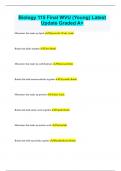
-
Biology 115 Final WVU (Young) Latest Update Graded A+
- Exam (elaborations) • 20 pages • 2024
-
Available in package deal
-
- $9.99
- + learn more
Biology 115 Final WVU (Young) Latest Update Graded A+ Monomers that make up lipids Glycerol & 3 Fatty Acids Bonds that lipids together Ester Bonds Monomers that make up carbohydrates Monosacchrides Bonds that hold monosacchrides together Glycosidic Bonds Monomers that make up proteins Amino Acids Bonds that hold amino acids together Peptide Bonds Monomers that make up nucleic acids Nucleotide Bonds that hold nucleotide together Phosphodiester Bonds Inputs of Glycoly...
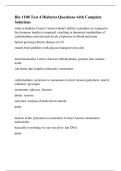
-
Bio 1108 Test 4 Diabetes Questions with Complete Solutions
- Exam (elaborations) • 16 pages • 2024
-
- $15.99
- + learn more
what is diabetes Correct Answer-body's ability to produce or respond to the hormone insulin is impaired, resulting in abnormal metabolism of carbohydrates and elevated levels of glucose in blood and urine fastest growing chronic disease in US results from problem with glucose transport into cells macromolecules Correct Answer-carbohydrates, protein, fats, nucleic acids can break into simpler molecules- monomers carbohydrates: polymers to monomers Correct Answer-polymers: starch, cellul...
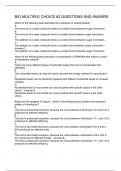
-
BIO MULTIPLE CHOICE #2 QUESTIONS AND ANSWRS
- Exam (elaborations) • 22 pages • 2024
-
- $13.49
- + learn more
Which of the following best describes the hydrolysis of carbohydrates? A The removal of a water molecule breaks a covalent bond between sugar monomers. B The removal of a water molecule forms a covalent bond between sugar monomers. C The addition of a water molecule breaks a covalent bond between sugar monomers. D The addition of a water molecule forms a covalent bond between sugar monomers. - Answer-C The addition of a water molecule breaks a covalent bond between sugar monomers. Wh...
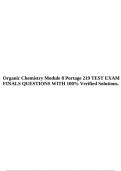
-
Organic Chemistry Module 8 Portage 219 TEST EXAM FINALS QUESTIONS WITH 100% Verified Solutions.
- Exam (elaborations) • 20 pages • 2024
-
- $11.99
- + learn more
Organic Chemistry Module 8 Portage 219 TEST EXAM FINALS QUESTIONS WITH 100% Verified Solutions. Polymer large molecule made by repetitive linking of smaller units (monomers) Macromolecule very large molecule composed of thousands of covalently bonded atoms (ex: polymer) 1. natural (in nature) 2. synthetic (in lab) two ways polymers are made rubber, carbs: starch & cellulose, proteins, nucleic acids DNA, RNA natural polymers nylon, teflon, styrofoam, polyethylene, Dacron, synthetic pol...
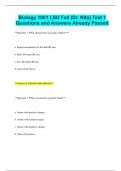
-
Biology 1001 LSU Fall (Dr. Nita) Test 1 Questions and Answers Already Passed
- Exam (elaborations) • 13 pages • 2024
-
Available in package deal
-
- $9.99
- + learn more
Biology 1001 LSU Fall (Dr. Nita) Test 1 Questions and Answers Already Passed **Question 1: What characterizes an acidic solution?** a. Equal concentration of H+ and OH ions b. More H+ than OH ions c. Less H+ than OH ions d. None of the above **Answer: b. More H+ than OH ions** **Question 2: Where are protons typically found?** a. Atoms with positive charges b. Atoms with neutral charges c. Atoms with negative charges d. None of the above **Answer: a. Atoms with positive ...
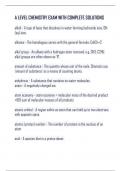
-
A LEVEL CHEMISTRY EXAM WITH COMPLETE SOLUTIONS alkali - A type of base that dissolves in water forming hydroxide ions, OH- (aq) ions. alkanes - The homologous series with the general formula: CnH2n+2. alkyl group - An alkane with a hydrogen atom remove
- Exam (elaborations) • 42 pages • 2024
-
Available in package deal
-
- $19.49
- + learn more
A LEVEL CHEMISTRY EXAM WITH COMPLETE SOLUTIONS alkali - A type of base that dissolves in water forming hydroxide ions, OH- (aq) ions. alkanes - The homologous series with the general formula: CnH2n+2. alkyl group - An alkane with a hydrogen atom removed, e.g. CH3, C2H5; alkyl groups are often shown as 'R'. amount of substance - The quantity whose unit of the mole. Chemists use 'amount of substance' as a means of counting atoms. anhydrous - A substance that contains no water mo...
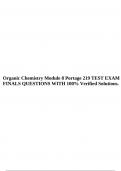
-
Organic Chemistry Module 8 Portage 219 TEST EXAM FINALS QUESTIONS WITH 100% Verified Solutions.
- Exam (elaborations) • 20 pages • 2024
-
- $11.99
- + learn more
Organic Chemistry Module 8 Portage 219 TEST EXAM FINALS QUESTIONS WITH 100% Verified Solutions. Polymer large molecule made by repetitive linking of smaller units (monomers) Macromolecule very large molecule composed of thousands of covalently bonded atoms (ex: polymer) 1. natural (in nature) 2. synthetic (in lab) two ways polymers are made rubber, carbs: starch & cellulose, proteins, nucleic acids DNA, RNA natural polymers nylon, teflon, styrofoam, polyethylene, Dacron, synthetic pol...
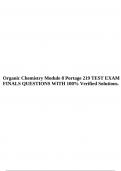
-
Organic Chemistry Module 8 Portage 219 TEST EXAM FINALS QUESTIONS WITH 100% Verified Solutions.
- Exam (elaborations) • 20 pages • 2024
-
- $11.99
- + learn more
Organic Chemistry Module 8 Portage 219 TEST EXAM FINALS QUESTIONS WITH 100% Verified Solutions. Polymer large molecule made by repetitive linking of smaller units (monomers) Macromolecule very large molecule composed of thousands of covalently bonded atoms (ex: polymer) 1. natural (in nature) 2. synthetic (in lab) two ways polymers are made rubber, carbs: starch & cellulose, proteins, nucleic acids DNA, RNA natural polymers nylon, teflon, styrofoam, polyethylene, Dacron, synthetic pol...
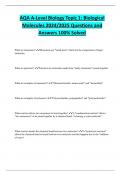
-
AQA A-Level Biology Topic 1: Biological Molecules 2024/2025 Questions and Answers 100% Solved
- Exam (elaborations) • 22 pages • 2024
- Available in package deal
-
- $14.99
- + learn more
AQA A-Level Biology Topic 1: Biological Molecules 2024/2025 Questions and Answers 100% Solved What are monomers? Monomers are *small units* which are the components of larger molecules. What are polymers? Polymers are molecules made from *many monomers* joined together. What are examples of monomers? *Monosaccharides, amino acids* and *nucleotides* What are examples of polymers? *Polysaccharides, polypeptides* and *polynucleotides* What reaction allows two monomers to bond together? A...
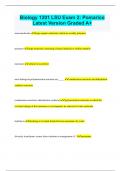
-
Biology 1201 LSU Exam 2: Pomarico Latest Version Graded A+
- Exam (elaborations) • 20 pages • 2024
- Available in package deal
-
- $9.99
- + learn more
Biology 1201 LSU Exam 2: Pomarico Latest Version Graded A+ macromolecules large organic molecules which are usually polymers polymers large molecules consisting of many identical or similar subunits monomer subunit of a polymer most biological polymerization reactions are_____ condensation reactions aka dehydration synthesis reactions condensation reactions (dehydration synthesis) polymerization reactions in which the covalent linkage of the monomers is accompanies by removal...

How did he do that? By selling his study resources on Stuvia. Try it yourself! Discover all about earning on Stuvia


